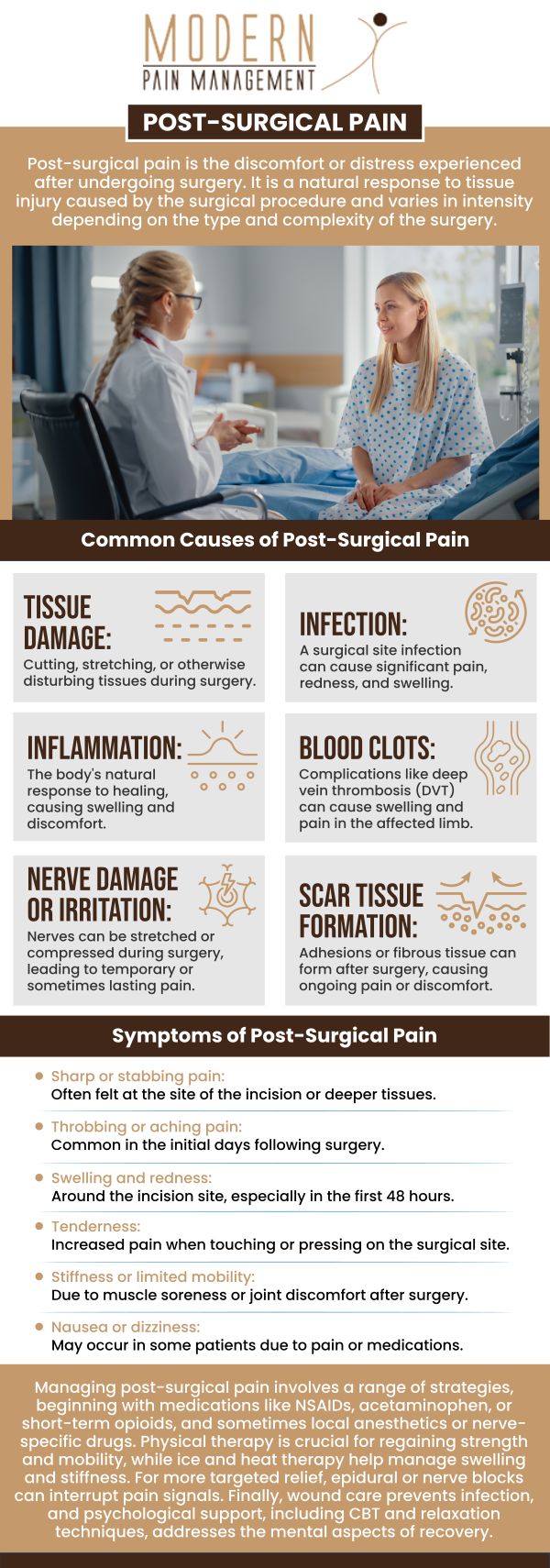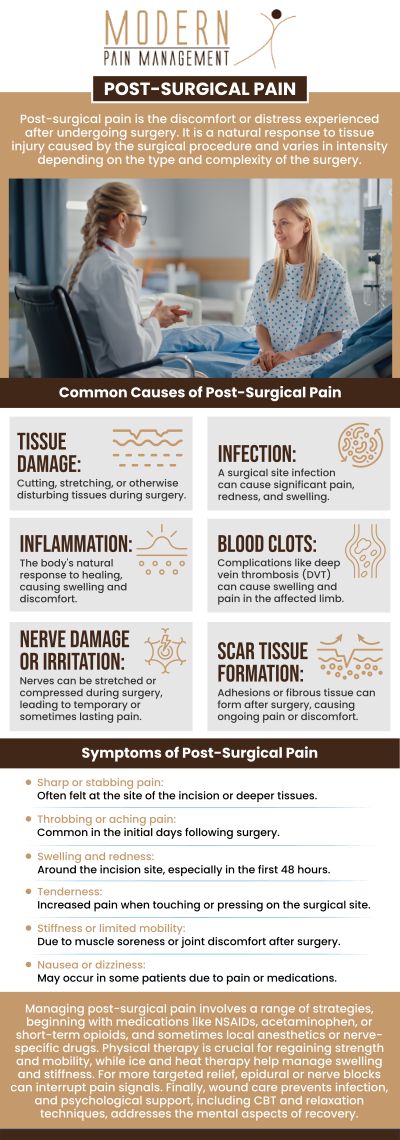Post-Surgery Pain Syndrome Treatment Specialist in Houston TX
Post-surgery pain can be mild to severe, whatever you are feeling, understand we are here to help. No one should suffer from pain after a surgical procedure. Contact Dr. George Atallah, D.O at Modern Pain Management today and get effective treatment for post-surgery pain syndrome. We are conveniently located at 902 Frostwood Drive, #235, Houston, TX 77024. For more information, please call us or request an appointment online.




Table of Contents:
What is post-surgery pain?
How long does chronic post-surgical pain last?
What helps pain after surgery?
How do you treat post-surgery pain at Modern Pain Management?
Post-surgical pain is pain that occurs from a surgical procedure. This type of pain can be from a number of possible causes, including:
• Skin tissue damage at the incision site
• The surgical procedure itself
• Closing of the wound
• A force that is applied during the surgery
Post-surgical pain can have other causes as well, like back pain from lying on the surgical table for long periods of time. Throat pain is quite common due to general anesthesia, as the breathing tube can cause irritation. Surgical pain can feel different for everyone, as there are different types of pain you can experience after surgery, including:
• Nociceptive Pain
Nociceptive pain is usually caused by tissue damage. This particular type of pain can include damage to:
• Bone
• Muscle
• Skin
• Organs
Nociceptive pain is one of the most commonly experienced pain. There are different types of nociceptive pain which include:
• Superficial Somatic Pain
This particular pain is caused by an injury. It does improve with healing and is typically gone once the healing aspect has commenced. Superficial pain comes from an injury to the surface of the skin which includes:
• Cuts
• Bruises
• Burns
• Wound from a surgical incision
• Deep Somatic Pain
Deep Somatic pain occurs when pain is felt deep within the body, this including affecting tissues like:
• Ligaments
• Bones
• Muscle
• Tendons
Often you will feel deep somatic pain from a broken bone or a sprain.
• Visceral Pain
Visceral pain occurs within the internal organs. This type of pain you feel when you have appendicitis or gas pain. This particular pain does not always come from the location where the issue is occurring, but like it is occurring in another area of the body, which can make it difficult to pinpoint its origins.
Visceral pain can occur due to surgery, but it can also be caused by organ damage like an infection or cancer.
• Neuropathic Pain
Neuropathic pain is pain caused by damage to the nerve cells. This damage is caused as a result of surgery. However, neuropathic pain can also be caused by injury or diseases including diabetes.
The different types of neuropathic pain include:
• Central Neuropathic Pain
Central neuropathic pain occurs after the damage has happened to the spinal cord or brain. This type of pain can be caused by surgical damage to a nerve, which might occur during head, brain, or spinal surgery.
• Peripheral Neuropathic Pain
Peripheral neuropathic pain comes from nerves that are not a part of the brain or spinal cord.
• Referred Pain
Referred pain happens when the brain is not able to tell where the pain is coming from. This can happen due to the brain getting bundled information from different areas of the body through one set of nerves. An example of this type of pain is during a heart attack.
• Phantom Limb Pain
Phantom limb pain is quite unique. This pain includes a sensation from an area of the body that was amputated. While the name can be misleading, the pain is still occurring, it occurs within the nervous system, and often this particular kind of pain will be medicated to help.
Chronic post-surgical pain can last on average a minimum of 2 months, and depending on any exterior causes, or conditions after surgery, it can last even longer.
There are a few different options available for pain after surgery including:
• Intravenous patient-controlled analgesia is a computerized pump that safely allows you to push a button to deliver small amounts of pain medication through the IV line into your arm.
• Patient-controlled epidural analgesia which is frequently used in childbirth is a patient-controlled pump that delivers pain-control medicine into an epidural catheter that has been previously placed in the back.
• Nerve blocks can be offered to isolate the pain to a small area of the body, and a small amount of narcotic medication can be used to help.
Pain medications can be taken orally, but have to be prescribed by a doctor for your pain.
Our doctors will measure your pain based on how you rate the pain on a scale of 0 to 10 from a few questions that will be asked. This will help us to know where you are at with the pain, and what comfort level you need to get to.
At modern pain management, we offer several different types of pain management depending on the type of pain you are experiencing, as well as the severity of your pain:
• Nerve blocks
• Radiofrequency ablation
• Botox
• Interventional Pain Management
• Steroid Injections
Visit our clinic for the treatment of your pain. Call us or book an online appointment with our pain specialist, or visit our clinic conveniently located at 902 Frostwood Drive, #235, Houston, TX 77024. We serve patients from Houston TX, Sugar Land TX, Pearland TX, Jersey Village TX, Missouri City TX, Stafford TX, and Richmond TX.
Check Out Our 5 Star Reviews

ADDITIONAL SERVICES YOU MAY NEED




